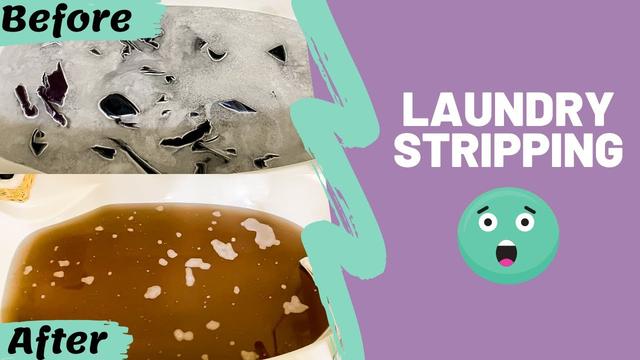Sure, you wash your dirty clothes, but have you tried the hot new “quarancleaning” trend of laundry stripping?
Laundry-stripping video tutorials have taken off on TikTok and other social media outlets, and for good reason. The videos start by showing a bathtub full of crystal-clear water, to which is added a load of supposedly clean laundry and a few magic ingredients. After a few time-lapsed hours go by, the water is a dingy gray-brown and the clothes are, presumably, really clean.
If you’re wondering how to strip laundry and whether it’s safe, you’re not alone. Here’s what you need to know about this viral cleaning trend and how to pull it off at home.
Laundry stripping is essentially a deep-cleaning process that rids your clothing and linens of all the nasty gunk, body oil, dirt, fabric softener, and other residue that may not be removed by regular washing machines.
“It provides physical proof that our regular laundry methods might not be working as well as we thought they were,” says Michelle Hansen, a professional organizer and cleaning expert with Practical Perfection.
Laundry stripping is actually a well-established cleaning process used by big companies like P&G, which makes laundry detergents and other household products.
According to Jennifer Ahoni, a senior scientist for Tide who works in the P&G Fabric Care laboratory, the company’s scientists use a special heavy-duty detergent instead of borax, baking soda, and regular detergent, but the goal and outcome is the same: superclean fabrics, without any unwanted residue.
“We strip fabrics before testing, and we also strip fabrics between testing,” she says. “We do this in order to eliminate contamination from chemicals applied to fabrics during the manufacturing process on new items and the transfer of laundry product residues on washed items between testing.”
If you want to try laundry stripping yourself, it’s pretty easy to get started with the following cleaning products you likely already have around the house:

People use varying amounts of each of these ingredients, but some of the most popular recipes call for around half-cup detergent, quarter-cup borax, and quarter-cup baking soda for a bathtub full of water.
In your own DIY laundry-stripping formula, each chemical has a role to play, Ahoni says.
The borax and baking soda help release hard-water minerals trapped in fabrics, the detergent breaks down and removes any buildup, and the hot water helps to loosen residues and other dirt, she says.
Start by filling a bathtub or a large sink with hot water, then add the detergent, borax, and baking soda. Stir the water (you can use a large spoon or a broomstick). Toss your clean laundry in, making sure you don’t overflow the tub, then stir the water again to make sure your laundry is submerged.
You can check on your laundry’s progress every few hours, but you’ll want to soak your clothes for at least five or six hours. By then, the water will probably have turned a dark, murky color.
Afterward, wring all the dirty water out of your laundry, drain the tub, toss the items into the washing machine and run them through the rinse cycle without any detergent. Dry and fold as normal.
While laundry stripping isn’t likely to ruin your linens, it can cause bright colors to fade over time, so you’ll want to do this sparingly with colors. You’ll also want to avoid using laundry stripping for delicates or anything that you’d otherwise take to the dry cleaner.
Before stripping, make sure to read the labels on your laundry carefully, since hot water is typically a no-go for fabrics like polyester or nylon.
White towels, bedsheets, and other linens, on the other hand, are fair game. You can even try laundry stripping on items like pillows, comforters, and blankets.
When you wear the laundry-stripped clothes or sleep under the sheets later, your skin isn’t likely to be irritated by all the various powders used in the process. That said, if your skin is extra sensitive, you’ll want to use a fragrance-free or unscented detergent.
“Laundry stripping is a long process and should only be done to clothes a few times a year to avoid damage to clothes,” Hansen says.
Bottom line: Though laundry stripping is kind of fun and the results are dramatic, it’s probably not something you’re going to do every day.
Ahoni says you can achieve similar results by washing with a heavy-duty hygienic laundry detergent or a purifying/detoxifying fabric softener like 9 Elements lemon laundry purifying softener (9 Elements, $21.99) in your regular washing machine.